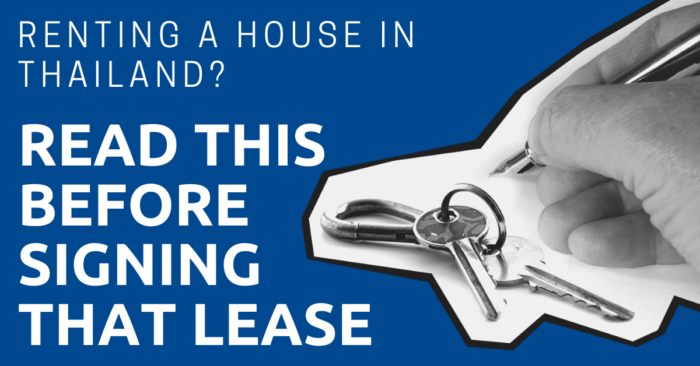
I’ve lived in Thailand since 2014, and I’ve rented my fair share of houses with a growing family of four.
From townhouses to detached homes, we’ve lived in them all. Plus, my wife owns a house that she rents out in Bangkok.
It’s safe to say that I’ve picked up a few pointers when it comes to renting a house in Thailand — both as a tenant and as a husband to a Thai landlord.
I’m going to share all I’ve learned so that you can find a house you’d be proud to call home.
By the end of this guide, you’ll know how to find a house for rent in Thailand, how much they go for each month on average, and what to look for in a lease.
"*" indicates required fields
Disclaimer: This article may include links to products or services offered by ExpatDen’s partners, which give us commissions when you click on them. Although this may influence how they appear in the text, we only recommend solutions that we would use in your situation. Read more in our Advertising Disclosure.
Contents
Key Takeaways
- Your two main options are townhouses and detached houses.
- Bangkok, Chiang Mai, Phuket, Pattaya, and Hua Hin are the most popular places for expats to rent a house in Thailand.
- When looking for a house to rent, use a real estate agent, search online, walk around your favorite neighborhoods, and ask friends for recommendations.
- Renting a house in Thailand isn’t for everyone. Make sure you understand the commitment involved.
- When it comes to leases, make sure you know what you’re agreeing to and signing.
Detached Houses Vs. Townhouses in Thailand
You’ll find two types of houses in Thailand:
- detached houses
- townhouses
Let’s compare and contrast each one in more detail.
Detached Houses
Detached houses are standalone houses that usually have lawns and driveways and are found mostly on the outskirts of Thailand’s major cities.
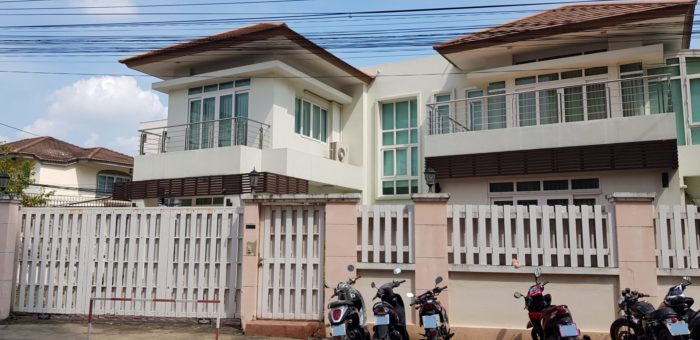
Some older homes still sit nestled among the concrete giants in the heart of the cities. But don’t expect to find any of these for rent. Mostly older Thais occupy these houses and refuse to sell their land to developers or rent them out.
The best thing about detached houses is the large spaces they offer you and your family to have parties, garden, play, or have a pet.
Detached houses do have some drawbacks though.
First, it’s up to you to maintain the property. If you have a lot of trees on the property, that could mean spending a few days a week raking up leaves.
And if any trees hang over your neighbor’s property, you may have to trim them back often.
Second, utilities will be a lot more expensive in a detached house. Because all the outside walls are exposed to outdoor temperatures, it will be much hotter inside.
You’ll probably run your air conditioners more, and that’s going to raise your monthly electric bill.
Townhouses
Townhouses are connected in rows and commonly found along Thailand’s suburban streets. Although they do exist in the cities too.
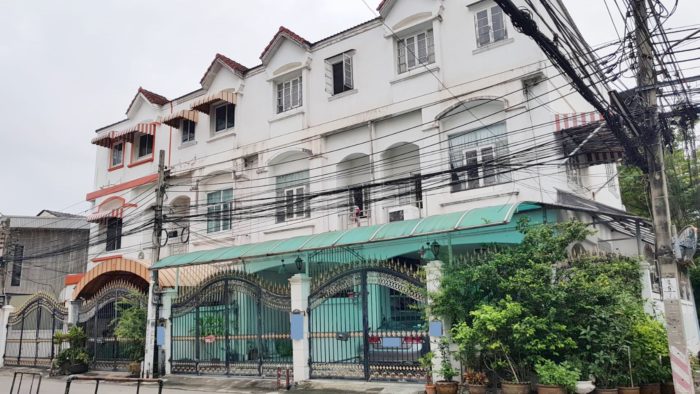
They usually have two floors, but in some places they could have as many as five floors.
Townhouses are also easier to maintain, as you won’t have a very big yard. You might get a front and back area at best. But these will be concrete and not grass. A few shrubs in the front may give you some privacy.
Also, your electric bill will probably be cheaper. If your townhouse is sandwiched between two others on the left and right, the walls won’t be exposed to the outdoor heat. In turn, you won’t run your air conditioners as much as if you lived in a detached house.
But a few downsides to renting a townhouse do exist.
First, they lack outdoor space. If you have kids, they won’t be able to run around in a yard. You won’t be able to plant a garden. And if you have a dog, it won’t have much room to stretch its legs.
Second, some townhouses don’t come with parking spots. Because of this, people who live in townhouses tend to park their cars in front of the other houses on the street, which leads to parking disputes with neighbors.
If you buy a car in Thailand and rent a townhouse, make sure you’re guaranteed at least one parking space, or that the townhouse comes with a driveway.
When looking at detached houses, you should always consider the size of the actual usable area inside the house, not the land size.
It’s possible that the house will be on a big piece of land but have little livable space.
If the detached house isn’t in a real estate housing development, you should be double careful with security.
Unless it’s in a gated community, your house can be a target for burglaries.
Cost
The cost of renting a house almost always depends on the size and location. But generally speaking, prices range anywhere from THB5,000 up until the hundreds of thousands of baht per month throughout Thailand.
| Location | City | Outskirts |
|---|---|---|
| Bangkok | 55,000 | 30,000 |
| Chiang Mai | 20,000 | 12,000 |
| Phuket | 25,000 | – |
| Huahin | 25,000 | – |
| Pattaya | 25,000 | – |
| Other | 8,000 | – |
For THB5,000 a month, though, don’t expect much. The only house in Bangkok I found for this price was a dilapidated detached house in Lat Krabang. I doubt many Thais – never mind any expats – would want to rent it.
On the other end of the price spectrum, many prestigious gated communities in Thailand offer houses for well over a hundred thousand baht per month. I’m taking mansions, though, with private pools and other up-scale amenities.
| Location | City | Outskirts |
|---|---|---|
| Bangkok | 30,000 | 15,000 |
| Chiang Mai | 12,000 | 6,500 |
| Phuket | 15,000 | – |
| Huahin | 15,000 | – |
| Pattaya | 15,000 | – |
| Other | 6,000 | – |
If you’re like me, you’re probably going to fall in the middle of these two extremes above and want to rent a house for between THB20,000 and THB50,000 a month. This price gets you a detached house in a middle-class gated community with shared pool, gym, and more.
To help you narrow down the cost of renting a house in Thailand, let’s look at prices in some of the major expat areas.
House Rental Prices by Province
Let’s take a look at some of the more popular places where expats tend to rent houses in Thailand.
Bangkok
As Thailand’s capital, Bangkok is a popular destination for expats. Some of these expats rent houses instead of condos. Maybe they need more space, have a home business, or are raising a family.
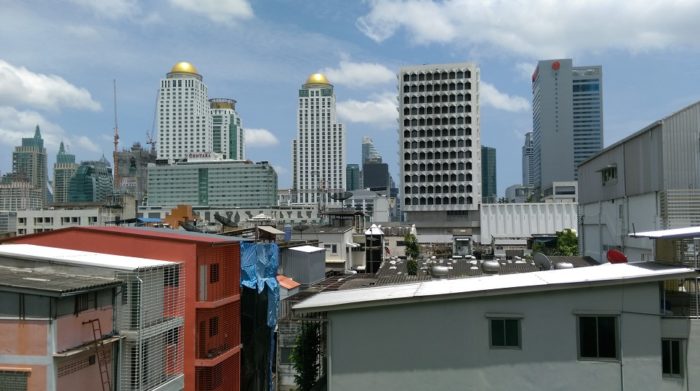
But the number of available detached houses and townhouses for rent in the center of Bangkok is dropping. Some are still available around Silom, Sathorn, and Sukhumvit, but they’re expensive.
So, expats tend to rent houses or townhouses off the main roads and in places like Bang Na.
- Best locations: Silom, Sathorn, Sukhumvit, outskirts of the city (Bang Na).
- Cost: On average, for a detached house in Bangkok expect to pay around THB70,000 a month in the city and THB20,000 on the outskirts. For a townhouse, the average monthly cost is THB30,000 in the city and THB10,000 on the outskirts.
Chiang Mai
Chiang Mai is one of the biggest provinces in Thailand. It’s also the biggest tourism province in the north and a popular retirement destination. So, many people are moving to Chiang Mai, including an increasing number of expats.
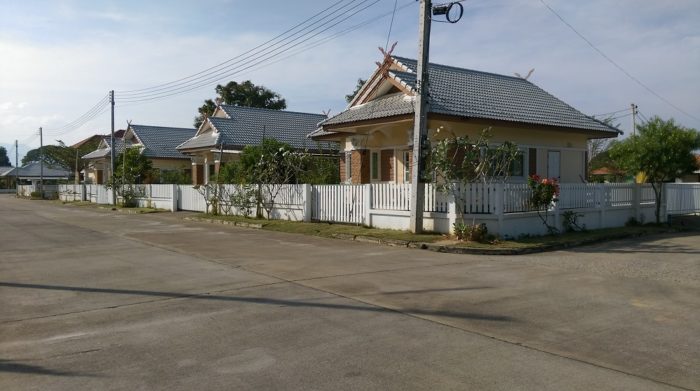
You can find houses for rent in Chiang Mai in many districts including around the moat. However, keep in mind the prices listed below are only averages. For more upscale rentals, you will have to double or triple the numbers below.
- Best locations: Chiang Mai City, San Sai, Hang Dong, San Kumpang, Saraphi.
- Cost: Detached houses in Chiang Mai cost about THB15,000 a month on average in the city and THB10,000 on the outskirts. Townhouses, on the other hand, cost about THB7,000 a month in the city and THB5,000 on the outskirts.
Phuket
Phuket is the smallest province in Thailand yet has the highest cost of living. In general, rental prices for houses in Phuket are similar to Bangkok.
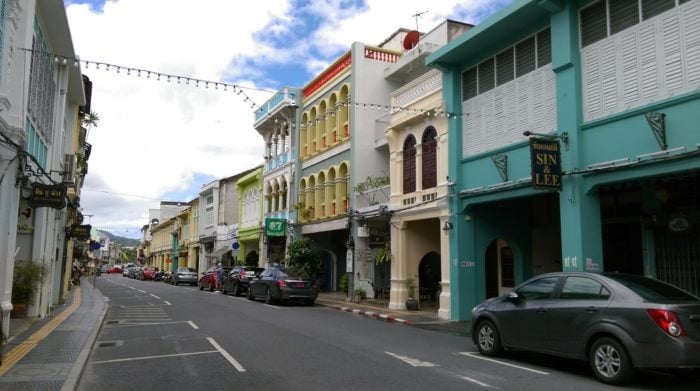
Although it’s one of the most famous beach destinations in the world, it’s not easy to find a house by the beach. These areas are heavily developed with luxurious condos and hotels.
But Phuket is full of inland housing projects available for rent, with both detached houses and townhouses. Rental prices depend on how close the property is to the beach. The closer it is, the higher the price.
- Best locations: Phuket Town, Patong, Kamala, Kata, Chalong, Rawai, Surin Beach.
- Cost: In Phuket, the average cost of detached house is THB25,000 a month in most places on the island. For a townhouse, the average monthly rent is THB10,000.
Pattaya
Pattaya is a famous city in Chonburi along the Gulf of Thailand. Although it has a bad reputation for its seedy area, Pattaya also has a “dark side,” or quiet area, where lots of Thai, expat, and mixed-race families live.
In these areas, you can find a range of detached houses and townhomes for rent, both near main roads and inside gated communities.
- Best locations: Eastern and northern Pattaya.
- Cost: On average, for a detached house in Pattaya the monthly cost is around THB15,000. For a townhouse, the average monthly cost is THB10,000.
Hua Hin
Hua Hin, like Pattaya, is a beach town on the Gulf of Thailand. Its beaches are a little more rocky than Pattaya’s, but many expats still enjoy them in the mornings, whether while out for runs or walking their dogs.
Hua Hin is diverse when it comes to monthly rentals. You can find inexpensive detached houses all along the outskirts of the city. In expat communities like Black Mountain, expect to pay a little bit more. And in upscale areas like Palm Hills, monthly rentals will be the most expensive.
- Best locations: Hua Hin city center, Khao Takiab, Khao Tao, Black Mountain, Palm Hills.
- Cost: A detached house in Hua Hin starts at around THB20,000 a month in the city center and THB10,000 in other locations. For a townhouse, the average monthly cost is THB15,000 in the city center and THB8,000 outside of Hua Hin city center.
Rural Thailand
In addition to the above areas, you can find more detached houses in other parts of Thailand for much cheaper. In fact, if you rent in one of the provinces below, you can double your living space for the same price you’d pay in Bangkok each month.
- Best locations: Buriram, Udon Thani, Roi Et, Korat, Kanchanaburi.
- Cost: On average, a detached house in rural Thailand costs around THB8,000 a month as long as you’re not near any downtown areas. For more upscale houses, expect to pay THB25,000 on average.
Finding a House for Rent in Thailand
When in comes to finding a house for rent, there are four different methods you can try:
- use real estate agents
- look online
- walk around
- ask friends
Use Real Estate Agents
In Thailand, anyone can be a real estate agent. There are no qualifications or licenses needed. So it shouldn’t take you long to find an agent, but you should vet him or her carefully.
Real Estate Agents in Thailand
Find Thai Space
Find Thai Space is a real estate agency in Bangkok that can help you find a place to buy or rent throughout the capital of Thailand.
Contact Find Thai Space- Free: You don’t have to pay real estate agents to help you find a place to rent. They get a commission from the property owners at no cost to you. The longer you rent, the higher commission they get.
- Convenient: Using an agent is the most convenient way to find a place to rent, but you may have to pay higher rent than if you dealt with the landlord because it’ll be harder to negotiate with a middle person.
In addition, this method is usually beneficial to those who want to rent for longer than six or 12 months.
If you need a real estate agent, use this form to contact one of our vetted real estate agents. A reputable real estate agent will get back to you within 24 hours.
Look Online
There are over 10 real estate websites where you can look for rental houses in Thailand.
When using websites, you can see the location, pictures, size, and price per month for rental properties. You can also get directly in touch with the person who posted the rental property.
DDproperty and Hipflat are two popular online property marketplaces in Thailand, with listings for thousands of rental houses.
In each listing, you’ll find:
- pictures of the property
- location
- map
- size
- number of bedrooms, bathrooms, and kitchen
- nearby facilities and transportation
Property rental websites give you a good idea on the average price of the area you want to live in, and you can quickly compare listings.
But if you see something you like, you should go have a look in person. The pictures you see online can be different from what is actually there.
Walk Around
Some houses for rent will have a “For Rent” sign posted in front with the price and contact info. You can walk or drive around your desired neighborhood to find these rental houses.
Every time we’ve ever found a house to rent, this has always been our go-to method. We usually drive to a neighborhood we like and drive around looking for “For Rent” signs.
It might take some time, but you can see the house in person and its condition, environment, transportation options, and meet your future neighbors.
You can call the number posted on the sign. If the owner lives nearby you can go inside the house and take a look right away.
Seeing the house in person can help you make a decision. And dealing with the owner gives you more room for negotiation.
Ask Friends
If you’re in Thailand, you can ask your network, including friends or coworkers, for recommendations on where to rent. They might’ve already done their own research and can suggest a good place to live.
They might know landlords or even have a house for rent, which can make the negotiation process easier.
What to Consider Before Renting a House
There are eight points to keep in mind before signing a lease:
- your budget
- size of the house
- location and nearby transportation
- property management company
- on-site security
- street dogs
- neighbors
- lease duration
Your Budget
Budget is the most important thing to consider when choosing a house to rent in Thailand. You should first estimate how much you’ll spend per month on all your expenses. After that, you’ll see how much you have in your budget for a house.
Size of the House
The size of the house should be able to accommodate the number of people who will live in it. If the house is too big, you’ll be spending money on wasted space.
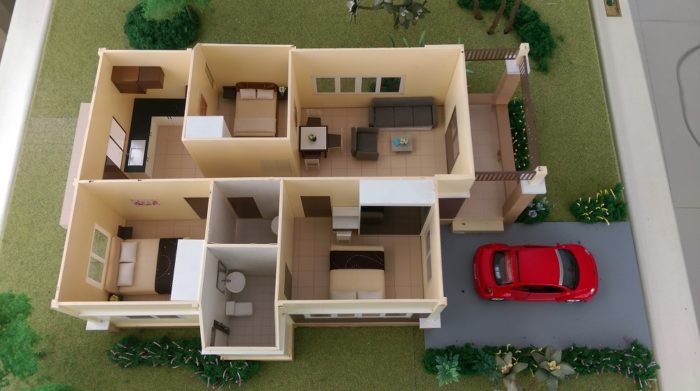
I once rented a five-bedroom detached house in Samut Prakan. It was great having a yard for barbecues and the kids to play in, but it soon became too overbearing. We spent more time cleaning and maintaining the house than we did enjoying it.
On the other hand, if the house is too small, you might be uncomfortable. We also experienced this when our second daughter was born. At that time, we were renting a two-bedroom townhouse and quickly grew out of it.
Location and Nearby Transportation
The house you rent should be in an area that’s close to supermarkets, work, your kid’s school, or even hospitals in case of emergencies.
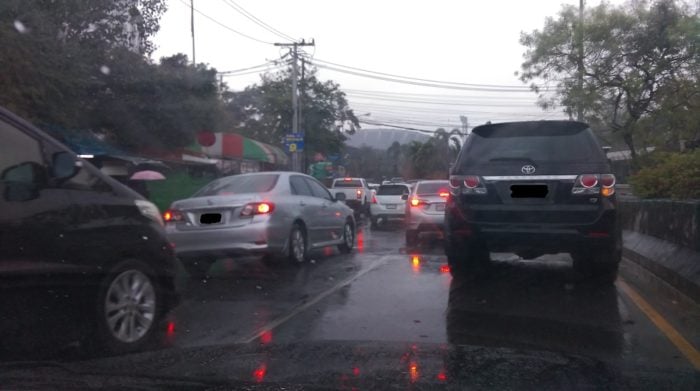
Because houses are usually located on the outskirts of cities and far from public transportation, you should go to the area and see how easy or difficult it is to get around during rush hour. You don’t want to live at the end of a road that takes 20 minutes to get up and down during rush hour.
Property Management Company
If you rent a house in a housing development, you need to make sure it has a solid property management company. A good property manager maintains the grounds, making the development a pleasing place to live in.
My in-laws own a few houses near Suvarnabhumi Airport, and the property management company barely maintains the grounds. The playground is overgrown with weeds and bushes. The in-ground pool is home to frogs and other creatures. And the roads flood so badly during the rainy season that the water comes into the house.
Check the quality of the property management company by looking at the conditions of the public areas, roads, parks, and swimming pools.
On-Site Security
Security is an important matter. You should make sure the housing development you live in has 24-hour security.
If you rent a house that’s inside a housing development, the development should have a security gate and a few security guards stationed there at all times. They should only open the gate for those who either have an access card or exchange their IDs.
Some housing developments have CCTVs installed throughout the public areas too. Make sure the cameras are working.
If the house you plan to rent isn’t inside a housing development, check the surrounding environment. You shouldn’t rent houses on dark roads where few people travel at night. Although it’s uncommon, burglaries can happen at houses with no security.
Street Dogs
Street dogs are everywhere in Thailand. So you shouldn’t be surprised to find street dogs that wander into your development every now and then. But if you live in a development with lax security, street dogs may stay in your development indefinitely.

I found this out a few years ago when I rented a townhouse behind Mega Bangna. It was a brand new development from Land and House — one of the top developers in Thailand. But yet, the security guards allowed local street dogs to get past the gates and into the development.
At night time they knocked over trash cans, tore open garbage bags, and even surrounded a neighbor as she tried to get out of her car. Sometimes, they barked all night long.
We called Land and House several times to complain, but they told us there are no laws in place to ban street dogs from entering a housing development.
This worried me because you sometimes hear stories of people getting bit by street dogs. Some dogs carry rabies, so it’s a good idea to stay away from them.
Neighbors
Potential neighbors are a great source of information. They can provide insider info that you can’t get from the landlord.
You can ask them about any problems they have in their house or neighborhood and ask about the safety of that area.
But neighbors could also be the source of some of the challenges you might face. Some neighbors might make loud noises at night and park their car in front of your house. Some may have dogs that chase people in the neighborhood.
But if you get a good neighbor, they can help you out. If you go on vacation, they can watch your house or pets or even water your plants while you’re away. In fact, one of my neighbors usually asks me for help with watering his plants when he goes on vacation.
Dealing with Landlords
Landlords will tell you that good tenants are hard to come by, and that once they find one, they want to keep them forever. But finding a good landlord is just as important.
I’ve had my fair share of good and bad landlords. Most of them have been accommodating, but others couldn’t be bothered with anything but collecting the rent.
We also have family friends who’ve been blessed with great landlords. One of our friends and his family have been renting the same house for 14 years, and never once did the landlord raise their rent in all this time.
On the other hand, we also know people who’ve been screwed by landlords and had to go to court. One of our friends had a landlord keep all their security money, even though nothing was damaged in the house and the lease stated that the money would be returned in full.
It’s hard to determine a good landlord from a bad landlord, so use your best judgment. And remember, just as you want a good landlord, the landlord wants a good tenant. The landlord might ask you questions about your job, lifestyle, visa, family, and why you came to Thailand.
But consider this: a good landlord is easy to reach. If anything is broken, they’ll fix it. If the light bulb doesn’t work, they’ll replace it. If the pipe is clogged, they’ll find a handyman to unclog it. They’ll even help you with Thai immigration matters.
Per Thai law, landlords have to give you supporting documents on many occasions for:
- resident certificates
- work permits
- tax certificates from the Revenue Department
- marriage visas
So when you negotiate your lease, tell the landlord that you’ll need his or her help throughout the year with these processes and make sure they’re okay with giving you:
- copies of their Thai ID card
- copies of their house registration (blue book)
- a signature from time-to-time
Even if the landlord had expat tenants in the past, don’t expect them to know about your specific legal or immigration needs. Always ask in advance.
Lease Duration
When renting a house in Thailand, don’t expect to find a landlord willing to give you a six-month lease. In fact, some landlords will want you to rent their house anywhere from a year to two years.
Over the last decade, I’ve had to sign a one-year lease, an 18-month lease, and a two-year lease when renting houses.
In my experience, it’s easier to negotiate with a landlord if you’re willing to sign an 18-month to two-year lease. So, if you plan on living in Thailand long-term and come across a house you love, don’t be afraid to ask the landlord for an extended lease, and a price reduction.
Signing a Lease
After you’ve negotiated rent and other matters with your landlord, it’s time to sign the lease. Here’s what you need to sign a lease:
- copy of your passport
- copy of your Thai visa (in some cases)*
- copy of your Thai work permit (in some cases)*
- security deposit and first month’s rent
*Although no landlord has ever asked me for these documents, some landlords may ask you for them. They want to make sure that you can stay in Thailand long-term and won’t have to break the lease and leave the country on short notice.
Leases are prepared by the landlord. In many cases, they get a template online and adapt it without hiring a Thai lawyer. Sometimes they Google translate a Thai lease into English without checking for accuracy.
So before you sign the lease, make sure it includes the following:
- agreed upon rental price
- duration of the lease (start and end dates)
- amount of security deposit (one or two months)
- whether the landlord will return your deposit in full seven days from when you move out, barring any damages
- rent due date each month
- who’s responsible for paying property management fees
- who’s responsible for maintenance costs on air conditioners
- any restrictions
Leases are prepared in two copies. You and the landlord sign both. The landlord keeps a copy and you keep a copy.
One thing to keep in mind is that Thais are not keen on the Thai legal system. They aren’t strict and try to resolve everything through negotiation. Don’t be surprised if landlords let you do things that the lease says you can’t. And don’t be surprised if landlords do things that the lease says he or she can’t.
But if you want to do anything in the house, such as paint or hang shelves, make sure you get approval from the landlord.
Notifying Thai Immigration
According to Thai law, you have to let immigration know whenever you move anywhere in Thailand. You’re supposed to do this within 24 hours of moving into a house. Realistically, it’ll probably take longer than that because you’ll be busy unpacking.
Technically, this is something the landlord is supposed to handle, but they never do. So it falls on us, the expats. If you want to give yourself a little leeway, ask the landlord if it’s okay that you move in a few days earlier than the lease begins.
This way, by the time the actual lease starts, you’ll be ready to go to immigration and register your new address. Usually, the landlord will be so happy that he or she has tenants that they’ll usually say okay.
Keep in mind that if you don’t register your new address, you will be fined the next time you do your 90-day check-in at THB200 per day, or a maximum of THB2,000.
Household Expenses
You have to pay other expenses every month in addition to rent when renting a house, including cooking gas, electricity, water, and Internet.
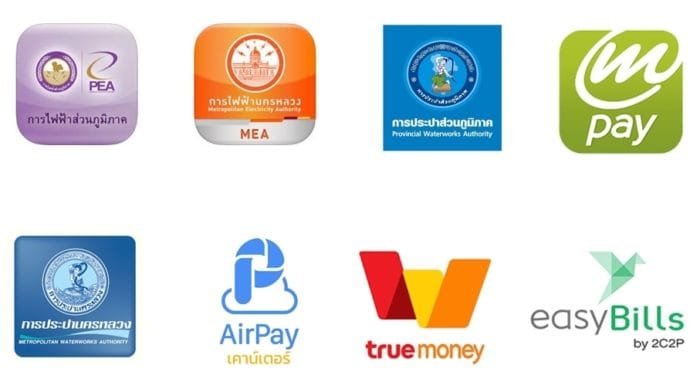
Cooking Gas, Electric, and Water
Cooking gas, electricity, and water are some of the other mandatory bills you have to pay when renting a house in Thailand.
- Cooking gas is fairly cheap, and if you don’t cook much, a tank will last you four to five months. If you cook every day, you can go through a tank of cooking gas in two months. We pay about THB600 for a large tank of cooking gas, delivered and installed.
- Electric is the most expensive utility. During the hot months when we run the air conditioners all day, the bill goes up to THB6,000 a month. During the cooler months, it drops down to THB3,000 per month.
- Water is inexpensive in Thailand, coming in at around THB300 every month for a family of four.
Utility bills come in the mail every month. You can pay these bills directly from your bank app or through one of the following ways:
- utility office
- convenience stores like 7–ELEVEN or Family Mart
- banks
- phone apps such as TrueMoney, mPAY, easyBills, CounterService Pay, and AirPay
- bank account or credit card
If you live in Bangkok, Nonthaburi, or Samut Prakan, you can download the MWA OnMobile and MEA apps to get real-time bills. If you live outside of Bangkok, check out PEA Mobile and PWA Wallet.
Internet
Some houses come with Internet already installed; others you have to have the Internet installed yourself. You can go through one of the four largest landline Internet providers in Thailand:
I’ve usually used AIS wherever I’ve rented, and it has been mostly reliable. There isn’t a big difference between quality, speed, and prices from these providers. Their Internet packages start at THB599 per month for 500/500 Mbps.
Some providers have a combined phone and Internet package. The difference comes from whether or not they have coverage in your area. If you live outside of the city, you may have only one option for the Internet.
To set up your Internet, go to one of the company branches with a copy of your passport and lease. Then, a service technician will come to your house a few days later to install a modem. You don’t have to pay any setup fees.
Internet packages tend to come with one-year contracts. If you cancel the package beforehand, you’ll need to pay a cancellation fee.
Breaking a Lease
There may come a time when you have to break a lease before it ends. I’ve been through this on two different occasions, and neither time did the landlord give us problems.
The first time, the landlord returned all our security deposit and wished us good luck. The second time, the landlord returned half our security deposit and asked us to please call him if we ever needed a place in the future. Neither was upset.
Life happens, and if you have an understanding landlord, he or she won’t hold you up if you’ve been on good terms throughout the duration of the lease.
Although I’ve had to break two leases, it wasn’t something I wanted to do. But I’ve always tried to make sure I had a renter waiting when we left. In the first case, that didn’t work out. But in the second case, I found another expat family down the road who wanted to live in the house we were renting.
Doing little things like that goes a long way with landlords and ensures you won’t burn any bridges (and guarantees at least some of your security deposit back).
Now, on You
Renting is one of the biggest expenses while living in Thailand. Before signing that lease, think carefully and make sure that everything is right.
If you have made it this far and still aren’t sure what to do before signing your lease or need help finding a house to rent, reach out to us and we’ll put you in touch with a vetted real estate agent.



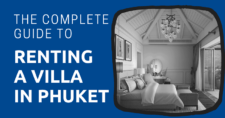

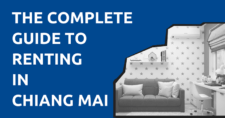
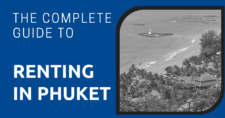
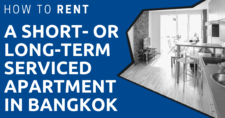

Thanks for the info. What do you do when a landlord ask for 2-months deposit when the law requires only 1-month deposit? I’ve looked at these several places, including Waterford and all ask 1-month rent + 2-months deposit.
Also, with Waterford, I’ve seen reviews where landlord doesn’t return deposit. How do we handle that?
Thank you again.